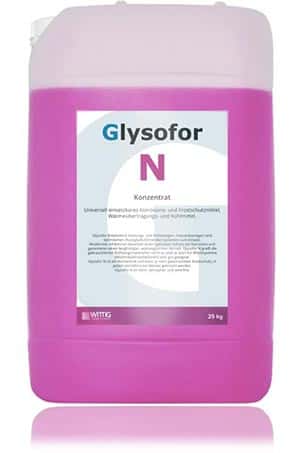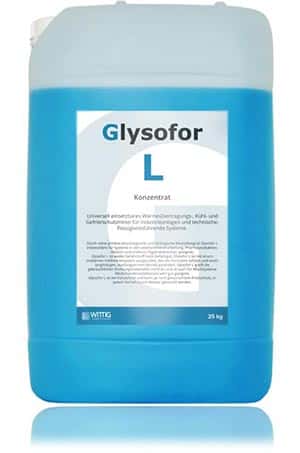Recommended products
Glysofor N
Antifreeze concentrate based on monoethylene glycol
Glysofor L
Antifreeze concentrate based on propylene glycol
In cooling processes, Glysofor concentrates offer a number of advantages compared to other technologies.
During cooling, refrigerating and defrosting processes, a constantly reliable system function is of decisive importance, as a system failure could for example result in decaying food or the damage of plants and production machines.
During cooling processes, the use of Glysofor N or Glysofor L has decisive advantages compared to other technologies.
Water
Water can only be used at temperatures > 1 degree C. This means that it cannot be used for many cooling and especially refrigerating processes. Compared to pure water, Glysofor has the advantage that it remains liquid and functional at temperatures of down to -50 degrees C. This means that Glysofor can be used in a much broader temperature scale, which significantly improves flexibility, especially in case of short-term temperature changes. Cooling times can be significantly reduced with Glysofor, which can increase production during production processes.
Salts
Preparations based on salt do offer a significantly lowered freezing point, but salt solutions are very corrosive towards metals. Nearly all metals which are used for cooling and refrigerating systems, are attacked by salt solutions. For this reason, salt solutions cannot be used in most plants. Glysofor products however are equipped with a modern inhibitor complex which protects all normally used metals optimally and permanently from corrosion. This enables an economic and service reduced operation of cooling plants.
Alcohols
Another variation of creating frost protection during cooling and defrosting processes is through the use of alcohols. Products based on alcohol do not normally contain any ethanol or isopropanol. The disadvantages of these product variations are obvious. Alcohols are easily volatile and flammable, which can be a problem with regard to handling and the operation of the plants. Glysofor however is neither volatile nor inflammable. Especially Glysofor L has no hazardous characteristics according to the applicable legislation concerning dangerous substances.
Other technologies
There is a number of defrosting processes such as heated water or gas or the use of electricity for heating purposes. The disadvantage of these processes is the high energy consumption which is significantly less economic compared to Glysofor.
Finally, the products Glysofor N and Glysofor L offer all important advantages which are relevant for a reliable operation of the system and a permanent economic operation of the plant.

